
“We’re doomed!” said Pte. Fraser in the cult BBC comedy, Dad's Army.
Well, that might be true if you’re concerned about global warming, the exhaustion of finite, carbon resources, the disappearance of tinority* languages like Busuu, the fact that the sun will burn out in around five billion years, or the B’ak’tun Cycle of the Mayans. For the rest of us, life goes on…
Ever since the last notional disaster of Y2K, which might just be a coincidence, we’ve been told that the days of the highly exclusive club of conventional telecommunications operators are numbered. The dismantling of the oligopoly and the resultant consumer freedom from practices that were based on over subscription and bundling were to herald a new dawn and sound the death knell for network providers.
However, the ‘unbundling’ of telecommunications services, despite its impact on the traditional, incumbent operators, hasn’t resulted in too many death throes. Do you know of any major player that has ‘gone to the wall’ in the ten years since VoIP has been lauded as the answer to life, the universe and everything? The major casualty has been, rather than the carriers, the telecommunications equipment manufacturers (TEMs). Look at the changing landscape of the big names and ask yourself what’s happened to the likes of Alcatel, Ericsson, GEC, Lucent, Marconi, Nortel, Philips, Siemens and any others of which you can think. The point is how they have changed.
Words like monolothic and proprietary have often been used to denigrate the traditional industry players, but it was always more so the case that it was the TEMs to which that applied. More particularly, it was the products they offered to which those terms applied and in the illusion that was created, the telcos and network providers suffered by association. After all, they were the ones that bought those products.
The beneficial change that has taken place over the last decade – yes, we’re now in the ‘teenies’ as opposed to the ‘naughties’ – has been the emergence of disruptive technologies such as open source, server virtualisation and cloud network architectures. All of these have benefitted from the bandwagon of IP, upon which you may stack VoIP and IP telephony. However, it does seem a myth that open telecommunications software platforms have more expansive feature sets than their predecessors. How many open source PBXs can offer the equivalent of all forty-nine DPNSS features?
What is true is that subscribers (now, there’s an outdated word if ever there was one) or consumers and business users now have far more than a handful of options. In the UK, there are at least 135 telecommunications operators and resellers, including those offering direct and indirect access, carrier pre-selection, call through (two stage dialling) schemes and VoIP. Interestingly, the total operator reported revenue over the last five years in the UK has remained fairly steady either side of the £40bn per year mark. Instead of showing a marked decline, it has shown a slight increase of five per cent over the period.
Those who attempt to persuade that open platforms have more expansive feature sets are disingenuous. The real issues are applications and services for which features are merely an enabler. The problem we faced five years ago was how to break out beyond simply recreating what was possible in the PSTN and offering hosted IP PBX services. Now, in the age of social media and with a wide array of ‘anything-as-a-service’ sized exactly to your needs available from within cloud networks, the landscape has been altered.
We can see the Tier 1 operators adapting to offer on-demand, pay-per-use, fully customisable, virtualised infrastructure that is designed for application hosting and storage, based on their existing physical network assets. Perhaps the TEMs, an endangered species if ever there was one, need to reinvent themselves as providers of ‘communications applications as a service’. Think unified communications and cloud computing; a marriage made in the heavens (or the void above the exosphere).
Are we doomed? On the contrary, we’re in the midst of the transition to a brave new tomorrow. As Capt. Mainwaring said, “Shut up! Fraser”.
*Note: a ‘tinority’ is smaller than a minority; by an order of magnitude.
About me
Andrew Nicholson is a Product Manager at Aculab responsible for the Prosody X and Prosody S media processing products. Aculab's latest product, AMS Server, sets out to speed and simplify the deployment of voice platforms for on-premise, hosted and cloud services.





 Technorati
Technorati Del.icio.us
Del.icio.us Slashdot
Slashdot Digg
Digg twitter
twitter


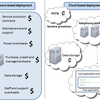
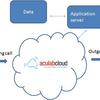
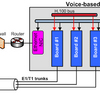
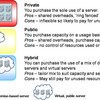
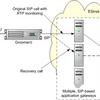















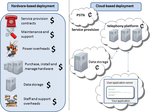







Leave a comment